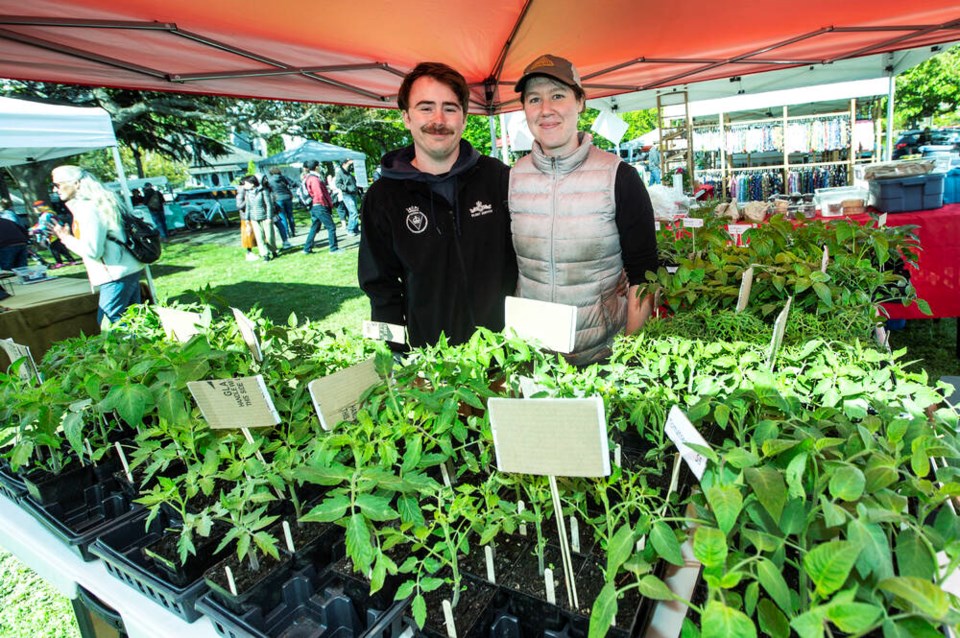On opening day of the James Bay Community Market, the sun emerged and the people poured in, a band played and Sarah Linde and Murray St. John gingerly laid out their tomato, hot pepper and herb plants with fingers crossed.
They’ve been carefully nurturing their plants for months — planting the seeds on the sailboat they live aboard in Esquimalt before moving them to a rented garden plot and small greenhouse in Colwood.
Linde, who has a customer service job, and St. John, who’s in the navy, use their seedling business to augment their incomes, but it’s been a nasty and unpredictable spring.
Continued cool temperatures, chilling winds and soakings of rain — even snow — have impeded growth and left gardeners a little wary about planting too soon.
“Last year it was 180 … it was warm and I was planting things in the garden,” Linde said.
Within a hour of setting up, however, Linde and St. John’s plants were being snapped up, Hungarian hot pepper, chives, parsley and heirloom tomatoes carted off to gardens around the city.
“I’ve had my garden dug up and ready for almost a month,” said one customer. “I’m going to plant these when I get home.”
Farmer and artisan markets are springing to life this weekend up and down the Island. You can find just about anything at these down-home markets, from preserves to paintings, homemade soaps to spreads and hand-crafted garments to home-raised beef.
But farmers were relatively few and far between Saturday, and those who were setting up shop had limited inventory. Most of the produce is still maturing in greenhouses.
Ben Kjernsted, who cultivates about 1.5 acres of his grandparents’ Sidney-area farm, had radishes and turnips and a lineup at his stand. “Most of what we have is still in greenhouses … everything outside is really slow; it’s a couple weeks late,” he said.
“It’s also super wet out there. … We can’t prep our beds because the tractors get stuck.”
Carol Elliott, manager of the James Bay Community Market, said it’s been a “horrible spring” and it’s keeping a few regular farmers away as they build produce inventory.
Three Oaks Farm, an organic vegetable producer in Saanich, was noticeably missing, but sent their regrets on social media.
“Because of all this rain (I’m sure you’re tired of it too!), we’ll be coming to our usual markets later in the season than usual,” the farm said on Instagram. They expect to be at market by the third week of the month.
The forecast isn’t expected to get any better this week, with Environment Canada calling for cloudy conditions with rain and temperatures ranging from 11 to 14 C during the day and dipping to 6 C overnight.
Over at the Moss Street Market, Mike and Sharyn Romaine, who operate Healing Farm — an 18-acre organic spread on Old East Road — are selling “value-added” items like fruit pies, chips, leathers and preserves, as well as farm-fresh eggs.
The cold spring weather is a concern for their almond, walnut and hazelnut trees, as well as their peach, cherry and apple trees. All are late in leafing, which Mike Romaine fears could result in smaller yields.
“It’s very unusual to see it this cold. … It’s the latest spring we’ve seen in 18 years,” he said.
Farmers are also buzzing about the health of the bee populations, he said, as the pollinators are staying in their hives waiting for temperatures to warm.
Mike Lachelt, who runs Salt Spring Island Wild Cider with Gerda Lattey, isn’t worried about the apple trees on Salt Spring Island.
Apples have been grown on the island since the late 1800s and have endured late springs, spotty pollination and drought with deep, well-established roots. There are more than 450 varieties are grown there, in backyards and in orchards — many left by early pioneers.
Lattey and Lachelt started the business in 2015 when they drove around in a pickup and asked to pick people’s apples. The first year, they squeezed out about 10,000 litres, and bartered cider for the apples.
“Now we’re over 10 times that,” Lachelt said.
The cidery pays about 200 apple producers about 40 cents a pound, which can mean cheques up to $2,000 for something that normally might go to waste, he said.
“You can’t be worried as a farmer,” Lachelt said of the weather, adding: “Every year is different. You just got to stick with it.”




